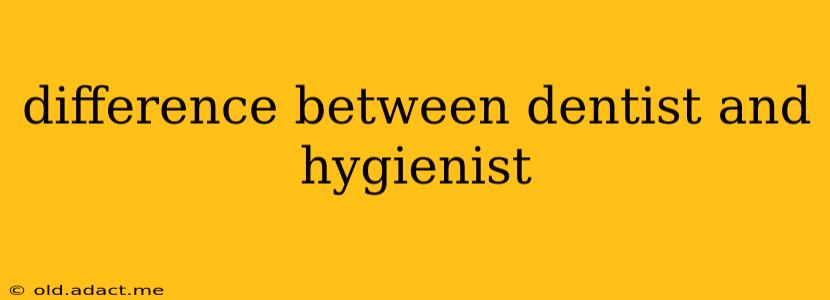Choosing the right dental professional for your needs can be confusing. While both dentists and dental hygienists play crucial roles in maintaining oral health, their training, responsibilities, and scope of practice differ significantly. This comprehensive guide will clarify the distinctions between these two important members of your dental care team.
What Does a Dentist Do?
Dentists are the primary healthcare providers for your teeth and gums. They are medical doctors who have completed extensive education and training, typically including:
- Four years of undergraduate study: This lays the foundation for their medical knowledge.
- Four years of dental school: This intense program covers a wide range of topics, including diagnosis, treatment planning, operative dentistry (fillings, crowns, etc.), periodontics (gum disease), endodontics (root canals), orthodontics (braces), oral surgery, and more.
- Potential specialization: After dental school, many dentists pursue specialized training (residency) in a particular area of dentistry, becoming specialists like orthodontists, oral surgeons, or periodontists.
Dentists are responsible for:
- Diagnosing oral diseases and conditions: This includes identifying cavities, gum disease, oral cancer, and other issues.
- Developing treatment plans: They create personalized plans to address your specific dental needs.
- Performing complex procedures: This encompasses everything from fillings and extractions to root canals, implants, and more complex surgical procedures.
- Prescribing medications: Dentists can prescribe antibiotics, pain relievers, and other medications related to oral health.
- Referring to specialists: If needed, they refer patients to specialists for more complex treatments.
What Does a Dental Hygienist Do?
Dental hygienists are licensed professionals who work as part of the dental team. Their role is focused on preventative care and maintaining oral hygiene. Their training generally involves:
- Associate's or Bachelor's degree: This focused program emphasizes the science of oral hygiene, preventative care, and patient education.
- Licensing examination: After graduation, they must pass a licensing exam to practice.
Dental hygienists primarily focus on:
- Providing preventative care: This includes cleaning teeth (removing plaque and tartar), polishing teeth, and applying fluoride treatments.
- Educating patients on oral hygiene: They teach patients proper brushing, flossing, and other techniques to maintain good oral health at home.
- Taking x-rays: They operate dental x-ray equipment to assist the dentist in diagnosis.
- Applying sealants: They apply protective sealants to the chewing surfaces of teeth to prevent cavities.
- Assessing for gum disease: They screen for signs of gingivitis and periodontitis, alerting the dentist to potential problems.
What is the Difference in Scope of Practice?
The key difference lies in their scope of practice. Dentists diagnose and treat a wider range of oral health problems, while dental hygienists focus on preventative care and assisting the dentist. A dental hygienist cannot diagnose or treat conditions independently; they work under the supervision of a dentist.
Can a Hygienist Diagnose Dental Problems?
No, dental hygienists cannot independently diagnose dental problems. They can identify potential issues and alert the dentist, but the final diagnosis and treatment plan are the dentist's responsibility. Their role is to assist the dentist in providing comprehensive care.
What are the Main Differences Summarized?
| Feature | Dentist | Dental Hygienist |
|---|---|---|
| Education | 4 years undergraduate, 4 years dental school | Associate's or Bachelor's degree |
| Scope of Practice | Diagnosis, treatment, complex procedures | Preventative care, assisting the dentist |
| Licensing | Licensed medical doctor | Licensed dental professional |
| Responsibilities | Diagnosing, treating, prescribing | Cleaning, educating, assisting the dentist |
By understanding the distinct roles of dentists and dental hygienists, you can ensure you receive the appropriate level of care for your oral health needs. Regular check-ups with both professionals are essential for maintaining optimal dental health.
